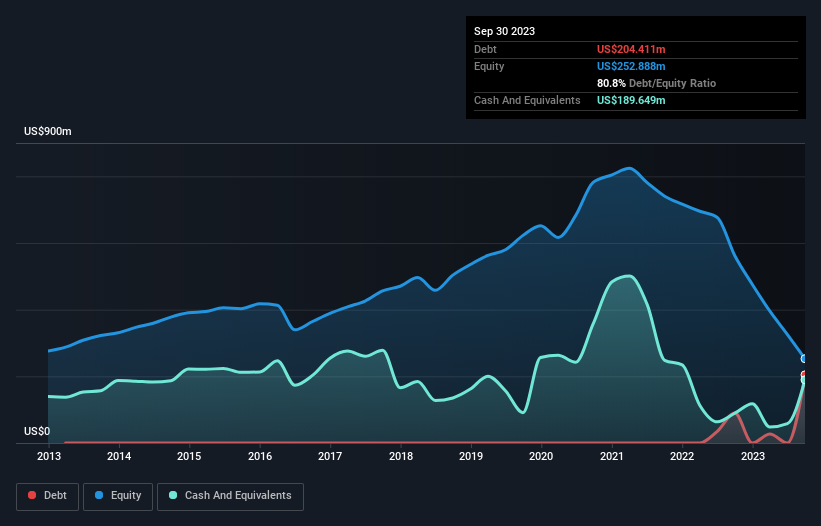- United States
- /
- Consumer Durables
- /
- NasdaqGS:IRBT
Would iRobot (NASDAQ:IRBT) Be Better Off With Less Debt?
Warren Buffett famously said, 'Volatility is far from synonymous with risk.' It's only natural to consider a company's balance sheet when you examine how risky it is, since debt is often involved when a business collapses. As with many other companies iRobot Corporation (NASDAQ:IRBT) makes use of debt. But the more important question is: how much risk is that debt creating?
What Risk Does Debt Bring?
Debt is a tool to help businesses grow, but if a business is incapable of paying off its lenders, then it exists at their mercy. If things get really bad, the lenders can take control of the business. However, a more usual (but still expensive) situation is where a company must dilute shareholders at a cheap share price simply to get debt under control. Of course, the upside of debt is that it often represents cheap capital, especially when it replaces dilution in a company with the ability to reinvest at high rates of return. When we think about a company's use of debt, we first look at cash and debt together.
Check out our latest analysis for iRobot
What Is iRobot's Net Debt?
You can click the graphic below for the historical numbers, but it shows that as of September 2023 iRobot had US$204.4m of debt, an increase on US$90.0m, over one year. However, it does have US$189.6m in cash offsetting this, leading to net debt of about US$14.8m.

How Strong Is iRobot's Balance Sheet?
We can see from the most recent balance sheet that iRobot had liabilities of US$325.4m falling due within a year, and liabilities of US$253.2m due beyond that. Offsetting these obligations, it had cash of US$189.6m as well as receivables valued at US$73.6m due within 12 months. So its liabilities total US$315.4m more than the combination of its cash and short-term receivables.
This deficit isn't so bad because iRobot is worth US$849.3m, and thus could probably raise enough capital to shore up its balance sheet, if the need arose. But it's clear that we should definitely closely examine whether it can manage its debt without dilution. The balance sheet is clearly the area to focus on when you are analysing debt. But ultimately the future profitability of the business will decide if iRobot can strengthen its balance sheet over time. So if you want to see what the professionals think, you might find this free report on analyst profit forecasts to be interesting.
In the last year iRobot had a loss before interest and tax, and actually shrunk its revenue by 27%, to US$941m. To be frank that doesn't bode well.
Caveat Emptor
Not only did iRobot's revenue slip over the last twelve months, but it also produced negative earnings before interest and tax (EBIT). Its EBIT loss was a whopping US$272m. Considering that alongside the liabilities mentioned above does not give us much confidence that company should be using so much debt. Quite frankly we think the balance sheet is far from match-fit, although it could be improved with time. For example, we would not want to see a repeat of last year's loss of US$325m. So to be blunt we do think it is risky. For riskier companies like iRobot I always like to keep an eye on the long term profit and revenue trends. Fortunately, you can click to see our interactive graph of its profit, revenue, and operating cashflow.
At the end of the day, it's often better to focus on companies that are free from net debt. You can access our special list of such companies (all with a track record of profit growth). It's free.
Valuation is complex, but we're here to simplify it.
Discover if iRobot might be undervalued or overvalued with our detailed analysis, featuring fair value estimates, potential risks, dividends, insider trades, and its financial condition.
Access Free AnalysisHave feedback on this article? Concerned about the content? Get in touch with us directly. Alternatively, email editorial-team (at) simplywallst.com.
This article by Simply Wall St is general in nature. We provide commentary based on historical data and analyst forecasts only using an unbiased methodology and our articles are not intended to be financial advice. It does not constitute a recommendation to buy or sell any stock, and does not take account of your objectives, or your financial situation. We aim to bring you long-term focused analysis driven by fundamental data. Note that our analysis may not factor in the latest price-sensitive company announcements or qualitative material. Simply Wall St has no position in any stocks mentioned.
About NasdaqGS:IRBT
iRobot
Designs, builds, and sells robots and home innovation products in the United States, Europe, the Middle East, Africa, Japan, and internationally.
Moderate risk and slightly overvalued.
Similar Companies
Market Insights
Community Narratives




